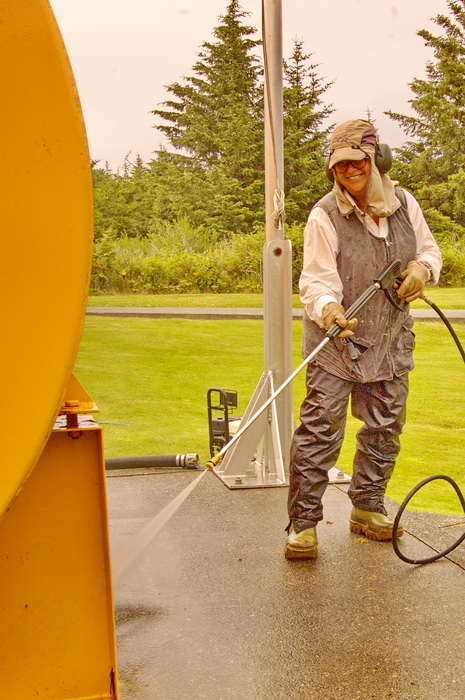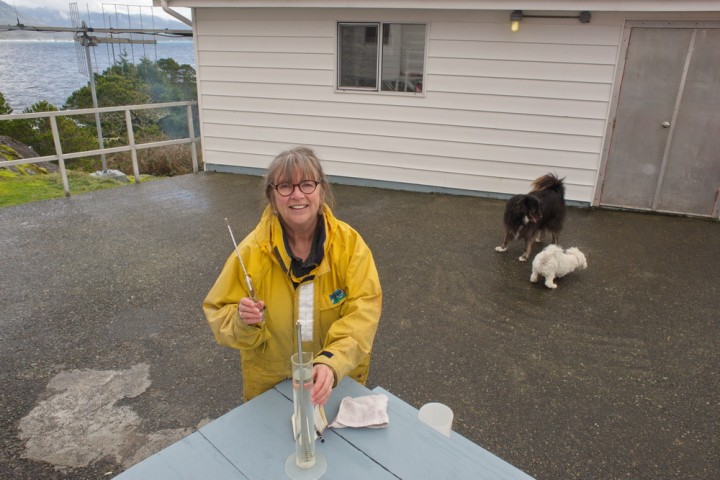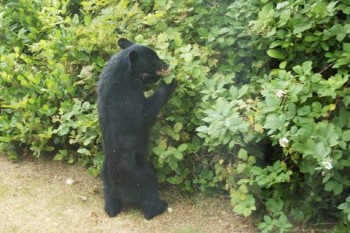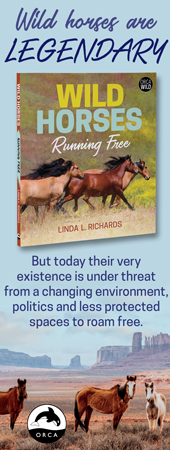Lighthouse lit
Caroline Woodward's work-in-progress is a memoir about West Coast lighthouse keeping and her life in books. Here BCBookLook provides an excerpt.
February 24th, 2014

Caroline Woodward, in 2009, behind the more-than-a-century-old Fresnel lens on Pachena Point's historic lighthouse that is featured on a Canada Post stamp.
By Caroline Woodward, photos by Jeff George
It all started with a runaway Jack Russell terrier on the open deck of a B.C. ferry bound for Alert Bay. I’m a dog-lover so I scooped up the grey-muzzled fellow before he came to any harm. I held on to him and scanned the drivers and the foot passengers. Soon enough, an anxious middle-aged man appeared and I knew exactly who he was looking for between the rows of parked cars and trucks.
The fall day was brilliantly sunny and like many ferry passengers on the west coast, the Jack Russell owner and I chose to stand outside on the deck of the boat. I was beside my Chev Tracker, packed to the roofline with plastic tubs and cardboard boxes filled with catalogues and books, as usual, a reliable conversation piece. I explained that I worked as a publishing sales rep. He echoed my admiration for the quality of the exhibits at the U’Mista Cultural Centre and the strong community life shared by the aboriginal and white residents of the historic fishing village. He said he was on his way to a six week stint as a relief lightkeeper on neighbouring Malcolm Island, the next ferry stop after Alert Bay on Cormorant Island.
“Wow!” I said and then went on to say what I’ve now heard from others at least one hundred times over. “I thought all the lighthouses in B.C. were shut down.”
I was patiently educated on the spot with a brief history of the repeated attempts, in the 1980’s and 1990’s, to de-staff the lighthouses, a political debacle vehemently opposed by mariners, aviators and several strong allies, most notably MP, and then Senator, Pat Carney, in government at the federal level. Twenty-seven B.C. lighthouses, as of that September day in 2007, were still staffed by human beings although dozens more were automated before decision-makers called a halt.
I sold hundreds of copies annually of two popular history books published by Harbour from the 1990’s, Lights of the Inside Passage and Keepers of the Lightby lightkeeper Donald Graham, to booksellers on the BC coast but I had not made time to do more than a quick skim myself. I made a mental note to correct that situation. My curiosity was really piqued for another reason though.
“Do you have to be an engineer or mechanic to be a lightkeeper?” I asked.
No, explained my new acquaintance, who gave me a capsule history of his own life as a civil servant, rising to become a regional manager in the BC Interior. Then he visited one of his sons who had found work in Port Hardy at the northern tip of Vancouver Island. He felt an immediate excitement and bonding with the wild Pacific Ocean and the lively northern community. ‘This is where I need to be!’ he declared to himself on the spot. It wasn’t the kind of idle dreaming we nearly all indulge in while on scenic holidays. He made the Big Change, leaving the management desk job and all the trappings of a successful, dull life behind, not an easy thing at all. I have always been averse to feeling trapped myself so I listened well.

Caroline Woodward pressure-washing the fuel tanks at Estevan Lightstation during a summer relief stint. “Ear protectors and full-on sun protection plus steel-toed gumboots are her constant accessories,” she says, “a far cry from worrying about whether I should be getting blonde streaks or red highlights in my hair for my book presentations!”
He assured me that as long as a person was capable of handling radio communications by taking an operator’s course readily available through the Canadian Sail and Power Squadron teaching network and had updated first aid qualifications, one could qualify to be a relief lightkeeper. Being handy with tools and machines were good practical skills to possess but it wasn’t necessary to be a stationary engineer or a heavy-duty mechanic. He mentioned doing weather reports by radio and that the permanent lightkeepers trained the newcomers, as every station had a different set of visual guides to work with and different instruments to utilize. Doing relief work was a good way to see if the lifestyle appealed on a more permanent basis, he said.
Then I drove off to my book-selling appointments and he and his little companion went off to give the lightkeeper his annual holiday break at Pulteney Point Lightstation on Malcolm Island. I now know that lightkeepers work seven days a week, for months at a stretch, and also that relief keepers are much-needed for medical, dental and family emergencies and for annual holidays.
On the wild and lovely three-hour drive home from Port McNeill to Union Bay the next day, I kept mulling over his practical advice. I remembered how his face lit up when he said how he felt deeply alive upon arriving in Port Hardy.
And wasn’t that exactly how I missed feeling? And wasn’t that even more the case for my husband, who dutifully worked at all kinds of low-paying, part-time jobs with awful hours and no benefits or holidays for years on end? I, at least, had an interesting job with great benefits, my first literary job with a dental plan, as I liked to quip. I could read some of the best new books in the English-speaking world, for free, hundreds and thousands of them every year. But I wasn’t doing what I really wanted to be doing with my life and I knew it. My chronic headaches, back spasms and weight gain reminded me constantly that I was out of whack, missing the sizzle and spark and solitude. I was a writer who was too busy working at peddling thousands of other people’s books annually to manage more than two Saturdays a month on my own work, hidden behind the Foreign Books section in the Courtenay Library.
Writing is not, as I have patiently explained to a close relative, like darning socks, something that you pick up with a happy little sigh of contentment at the end of a long and exhausting day.
I have to say my heart was broken then, in several places, during that busy and frustrating decade-and-a half of trying and apparently failing to write something that somebody out there would take a chance on and publish. So I dutifully kept my shoulder to the family and work wheel, I enjoyed my community life and the real gratification that comes from serving others, and I kept on writing in fits and starts. We’d done our job as parents, raised a fine young man who had graduated from college and found work in his field, and raced sailboats all around the world, and now what?
Maybe it was our turn now, to launch into new adventures, adventures that could give both of us time to write and photograph and paint and grow a massive garden? And kayak and make quilts and learn a couple of musical instruments and make a salmon smoker. Time to think and listen to birds singing and know exactly who the singer was, time to stare through binoculars at whales spouting off in the distance and dolphins twirling amongst them and eagles soaring in wide, slow circles above. Time for new happiness, for new adventures while we were still capable and healthy, if somewhat grey around the muzzles ourselves. Jeff’s fingers flew over his keyboard until he found the federal government jobsite.
He applied to be a relief lightkeeper within 24 hours, with my unreserved blessings. I didn’t comprehend that I was encouraging us to live apart for fourteen long months. I just wanted him to be happy and to go out on adventurous assignments and to tell me all about them when he got home. I wanted him to write stories and to take all kinds of photographs again. Maybe he would learn to play the beautiful old banjo I’d bought him many Christmases ago. I thought maybe I’d write more without his company at home, as well. As if! All I did was work longer at my publishing job, of course, habituated to putting the needs of others first.
I also read Don Graham’s excellent books about the history of lighthouses and lightkeepers in this province from cover to cover. While I explained Harry Potter embargos to my booksellers and met lovely, interesting people like the painter E.J. Hughes, I dreamed of finally finishing the novel I’d started in 1995 and about fifty other ideas on my back burner. Short of committing a serious crime like dropping two tons of books on Stephen Harper’s head and then requesting solitary confinement or shucking my family ties and applying to a convent under false pretences, the lighthouse life was the most appealing destination I could imagine for myself as a writer. Life is short. My early books were literary orphans, thanks to the unholy, imperfect storms which crippled or fatally wounded Canadian publishers and booksellers in the previous fifteen years. I had to start all over again. I could barely think a clear, coherent story line of my own because my head was so cluttered.

Caroline Woodward measures the sea water temperature and salinity at Nootka Lightstation, a daily task conducted at high tide at selected stations on the BC coast
As I had hoped, my husband loved most of the light-keeping life. The biggest downside was not sharing it except for several wonderful visits to remote Egg Island where he worked for four months and a transfer to Trial Island, near Victoria, which was easier to get to. I winnowed my workload down so as not to stiff my colleagues with onerous extra hours of work. Then I bowed out as gracefully as I could muster.
I went to night classes and weekend sessions to get my radio operator’s certificate and my standard and marine first aid tickets. I sold as much stuff as I could in garage sales and gave away even more stuff. I arranged for a moving company to get the remaining goods down to the dock in Victoria so a Coast Guard ship could eventually transport it to Lennard Island. Joy of joys, Jeff had landed the assistant light-keeper’s job on the station nearest to Tofino, where I had bookselling friends and writer colleagues already.
I grew up on an isolated Peace River homestead and once I leapt off the career ladder to apply myself to the long apprenticeship of becoming a writer, I’d spent years holed up by myself, writing and working as needed to keep on writing. I knew I’d thrive on the lighthouse circuit, doing relief work (which I do for six-to-nine months a year), gardening, making slow food and writing. It’s not without major challenges like getting along with yourself, your partner, the peccadilloes of other personnel, and getting used to shift work, not to mention relentless wind and rain and fog.
It suits me just fine. Within four years I’d published my novel, fifteen years in the making, a picture book which is now translated into French, Korean and Bulgarian, and a chapter book for 7-11 year olds. I have four more books written and in the process of being revised for public viewing. Life is wonderful and I count my blessings as well as whale spouts, Harlequin ducks, surfing sea lions, oystercatchers, sea otters…
About Caroline Woodward:
Caroline Woodward is a former bookstore owner who has turned to literature and lighthouse keeping
Fiction writer Caroline Hendrika Woodward, a former bookseller in the Kootenays, has served for six years with the Vancouver Foundation (an organization, “about which I cannot say enough good things”), has assisted the Caravan Stage Company in its horse-drawn tour of Law of the Land in 1981 and put local teenagers on stage to sing, act and dance with professional arts groups, “but when it comes down to the wire, I am, first and last, a writer with deep roots in the Peace [River region] and adventurous arms stretched out to South-East Asia and to group homes and greenhouses and grassroots arts organizations.” While at UBC she minored in fine arts history while acquiring her B.A. major in anthropology/sociology. She took studio classes with Toni Onley and studied First Nations art with Audrey Hawthorn.
Woodward and Jeff George started Motherlode Bookstore in New Denver in 1993 after her job with Polestar Press ended when owners Julian and Ruth Ross sold the company to Michelle Benjamin of Vancouver in 1992. “I had worked at Oliver’s Books in Nelson for two years part-time and also worked at Polestar, beginning as a manuscript reader in 1987, then as a one-shot publicist for Noel Hudson’s Mobile Homes. When that all worked out well, I went on to work part-time (our boy Seamus was still pre-school age) at Polestar as a publicist/copy writer/editor and finally as managing editor during a five-year time span. I was gobsmacked to be phoned by Julian and Stephanie Judy (head editor at that time) and offered a contract. That’s how Disturbing the Peace was born.”
Her experiences as a writer and bookseller led her to work as a publishers’ representative for Kate Walker & Company, based in Comox on Vancouver Island (“my first literary job with a dental plan!”). But she left that job in 2008 to join her husband Jeff, an Assistant Lightkeeper, at Lennard Island Lightstation, near Tofino, where she has been able to re-refocus on writing. She has earned the assistant lightkeeper qualifications to do (lightkeeping) relief work at the station and others on the west coast, and writes “in-between doing weather reports, painting, power-washing, lawn-mowing etc.”
In 2010, Woodward simultaneously released two new books “both of them springing (or glacially proceeding, more like it) from my Peace River roots.”
A West Coast-themed retelling of The Odyssey, Penny Loves Wade, Wade Loves Penny (Oolichan, 2010) is about an ‘inventive and resolute ranch wife’ and a ‘reluctant rancher and good man, adrift behind the wheel on his last long haul truck run of the season.’
Her other Peace River book, Singing Away the Dark (Simply Read Books 2010), is autobiography that tells the story of her mid-winter mile-long walk to the school bus stop, through a dark tunnel of trees, four barbed wire gates, past a herd of cattle and a cranky bull, and across a field where the north wind always blew hard. Dedicated “To Peace River children who are all brave and tough,” it has been translated into French, Korean and Bulgarian editions.
Woodward’s chapter book for 8-to-11-year-olds, The Village of Many Hats (Oolichan 2012) is her first book for that age group and also a departure from her her Peace River roots literature; it takes her to another set of valleys, the Kootenay and Slocan of southeastern B.C.
“Outside the vibrant cultural life and amenities of cities,” she says, “I have to say that the rural and semi-rural Kootenays possess the people, the wilderness, the do-it-ourselves attitudes and persistence to keep the arts in all its forms thriving, with a constant flow between all age groups that I have found nowhere else and that I still find truly remarkable. During the eight years that my partner and I founded and ran the Motherlode Bookstore, I was able to appreciate the way that people supported each other in times of crisis and in times of celebration, too.”
Date of Birth: March 14, 1952
Place of Birth: Fort St. John, B.C.
Awards:
Finalist for 1991 Ethel Wilson Fiction Prize (Disturbing the Peace)
Finalist for 1994 Arthur Ellis Award for Best First Mystery Novel (Alaska Highway Two-Step)
Finalist for the 2011 Marilyn Baillie Picture Book Prize.
Finalist for 2010-2011 Amelia Frances Howard-Gibbon Illustrator’s Award.
Nominated for the 2011 Ruth and Sylvia Schwartz Award (Picture Book category).
Nominated for the 2011-2012 Chocolate Lily Award (Picture Book category).
Canadian Children’s Book Centre Red-Starred Our Choice Award.
Books:
The Village of Many Hats (Oolichan 2012)
Penny Loves Wade, Wade Loves Penny (Oolichan: Fall 2010) fiction; novel
Singing Away the Dark (Simply Read Books: Fall 2010) children’s picture book, illustrated by Julie Morstad
Work is a 4-Letter Word (National Literacy Secretariat, B.C. Literacy & B.C., Ministry of Advanced Education, Training & Technology-co-published, 1999)
Alaska Highway Two-Step (Polestar: Vancouver, 1993)
Disturbing the Peace (Polestar: Winlaw, 1990)
A Blue Fable (New Printing Press: Kathmandu, Nepal, 1981)
Biographical Details:
Caroline Woodward was raised on her parents’ homestead at Cecil Lake, B.C. in the North Peace River region. She began her writing career in 1968 with a two-year stint as a weekly columnist for the Alaska Highway News in Fort St. John where she first encountered the formidable newspaperwoman, Ma Murray.
She earned a B.A. and Teacher’s Certificate from UBC and a Diploma in Creative Writing from David Thompson University Centre in Nelson, B.C. interspersed with paid and volunteer work in Sri Lanka, India, Nepal and Europe. She published travel articles in Canadian newspapers and magazines like Miss Chatelaine(‘Solo bicycling across Greece-May’, 1976) and in 1981, she wrote, designed and self-published A Blue Fable, printed on 12 pages of rice paper in Kathmandu, Nepal. This endeavor introduced her to the nuts and bolts of promotion, distribution and retailing in the Canadian book industry.
Always working an interesting variety of white, pink and blue collar jobs, she made Nelson, B.C. her home base from 1983-1991 where she continued to publish non-fiction articles, short stories, poetry, plays, book reviews and artist profiles for an assortment of media. The writing teachers she salutes from this period are Colin Browne, Paulette Jiles, John Newlove and Clark Blaise. She also became very involved with the Kootenay School of Writing as a volunteer organizer and instructor and with a plethora of other arts organizations in and around Nelson. Caroline started her long association with Polestar Press as a manuscript reader, author tour organizer, publicist, in-house editor and occasionally, managing editor. She also began her enduring friendship and collaboration with Paulette Jiles in the mid-1980’s, which resulted in several CBC Radio productions and a stage production, “For the Daughters”, a fundraiser for local scholarships for women, among many other informal antics like their Starving Artist Dinner Parties.
Woodward’s first collection of short fiction and prose poems, Disturbing the Peace, evoked her Peace River roots and was nominated for the 1991 Ethel Wilson Fiction Prize. Stories from this book have been reprinted in Canadian anthologies, many of which are used in high school and university English courses. Bravo TV adapted one story for its Spoken Word series of dramatic monologues. Her first novel, Alaska Highway Two-Step, is a road story containing a mystery, and was nominated by the Crime Writers of Canada for the Arthur Ellis Best First Mystery Novel category in 1994. She was then invited to be a panel presenter at the 1994 International Bouchercon Mystery Writers Conference in Seattle, Washington.
In 1993, Caroline and her partner, Jeff George, renovated a circa 1900 building on the main street of New Denver, B.C., population 700, and opened the Motherlode Bookstore. Always very involved in the rich cultural life of the Kootenays when based in Nelson (Kootenay School of Writing, Theatre Energy, Kootenay Lake Summer School of the Arts, Images Ad Hoc Singers to name a few), things got even busier in the village of New Denver. As well as helping to run the Motherlode, Caroline served as the Kootenay rep for the Federation of BC Writers (1994), served on the Board of Selkirk College for three years, joined the Valhalla Community Choir (go to CBC Radio’s OutFront site for Keep On Singing, Woodward’s homage to singing in choirs nearly all her life), joined the Board of the Slocan Lake Gallery Society for seven years, served on the arts and culture advisory committee of the Vancouver Foundation for six years and was appointed Vice-Chair of the inaugural B.C. Arts Council with Mavor Moore as Chair. While serving with the latter, she spearheaded the Youth Employment Program in the Arts to offer tuition credits and to mentor young people in cultural work, a successful and much-needed transfer of specialized knowledge program, which was slashed by the provincial Liberal government in 2001.
Woodward first began teaching creative writing classes in 1985 and has since taught hundreds of workshops and courses ranging in length from half a day to a full four-month term for organizations as diverse as the Lasqueti Island Arts Council, the Sechelt Festival of the Written Word, the Kootenay School of the Arts, Elder Hostel, and three BC Festivals of the Arts. She has taught writers aged 8 to 80 plus and she has given over 100 public readings across Canada from Whitehorse to Montreal, from Dease Lake to Ottawa, from Calgary to Pouce Coupe.
– Alan Twigg




I’m with Howard White on this one: can’t wait for the rest of Caroline’s memoir. Thank goodness light station solitude has allowed her to quit “darning socks” and revive her gifted voice.
Caroline gives safe passage into ourselves and each other in each of her books. She is herself a lighthouse.
I think Caroline Woodward is one of BC’s best (and funniest) prose writers. I can’t wait to read this new memoir. In fact I’d be happy to publish it!